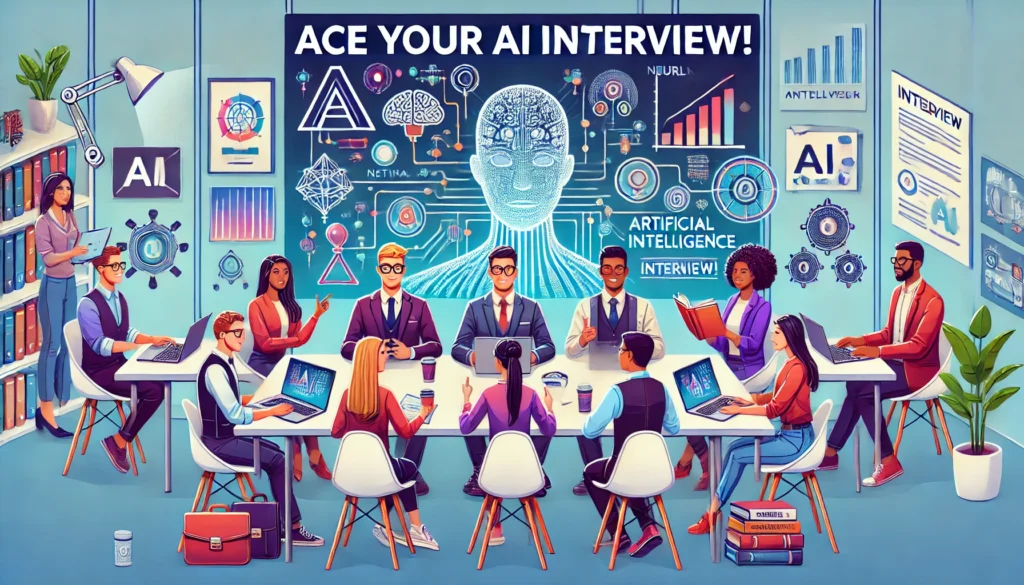Introduction AI Interview
Preparing for an AI interview can be a challenging task, especially for freshers who are stepping into the world of Artificial Intelligence. This comprehensive guide provides 100+ AI interview questions for freshers, covering basic concepts, technical skills, and real-world applications. Let’s dive into these questions to help you ace your AI interview and stand out from the competition.

What is Artificial Intelligence (AI)?
Answer: Artificial Intelligence, often abbreviated as AI, refers to the simulation of human intelligence by machines. It involves enabling machines to perform tasks that typically require human cognitive functions, such as reasoning, problem-solving, and learning. AI is categorized into three main types:
Self-aware AI: Hypothetical AI with its own consciousness.
Reactive Machines: Perform specific tasks without memory.
Limited Memory: Use past data for decision-making.
Why Prepare for AI Interview Questions?
AI is a fast-evolving field with diverse career opportunities. Interviews for AI roles test your understanding of fundamental concepts, mathematics, algorithms, and real-world applications. Preparing thoroughly with these AI interview questions for freshers ensures you demonstrate both technical knowledge and practical insight.
AI Interview Questions for Freshers
Below, we categorize the questions for better understanding and preparation.
Basic AI Concepts Questions and Answer
Q: What is Artificial Intelligence (AI)?
A: AI is the simulation of human intelligence in machines that are programmed to think, learn, and solve problems like humans.
Q: Who is considered the father of Artificial Intelligence?
A: John McCarthy, who coined the term “Artificial Intelligence” in 1956.
Q: What are the main types of AI?
A: The main types are Narrow AI (Weak AI), General AI (Strong AI), and Super AI.
Q: What is Narrow AI?
A: AI designed for a specific task, such as voice assistants or recommendation systems.
Q: What is General AI?
A: AI that can understand, learn, and perform any intellectual task that a human can.
Q: What is Super AI?
A: Hypothetical AI that surpasses human intelligence and capabilities.
Q: What is Machine Learning (ML)?
A: A subset of AI where machines learn from data to improve performance without explicit programming.
Q: What is Deep Learning?
A: A subset of ML that uses neural networks with many layers to process complex data.
Q: What is a Neural Network?
A: A model inspired by the human brain, consisting of layers of interconnected nodes.
Q: What is Natural Language Processing (NLP)?
A: A branch of AI that enables machines to understand and process human language.
Q: What is an algorithm in AI?
A: A set of rules or instructions for solving a problem or performing a task.
Q: What is a chatbot?
A: An AI program designed to simulate conversation with users.
Q: What is supervised learning?
A: An ML approach where the model is trained on labeled data.
Q: What is unsupervised learning?
A: An ML approach where the model finds patterns in unlabeled data.
Q: What is reinforcement learning?
A: A learning approach where an agent learns by interacting with the environment and receiving rewards.
Q: What is a dataset?
A: A collection of data used to train or test an AI model.
Q: What is a model in AI?
A: A representation of the knowledge learned by an AI system from data.
Q: What is computer vision?
A: A field of AI that enables computers to interpret and understand visual data.
Q: What is image recognition?
A: The process of identifying and classifying objects in images.
Q: What is a decision tree?
A: A flowchart-like structure used to make decisions based on data.
Q: What is a feature in machine learning?
A: An attribute or property of the data used to train an AI model.
Q: What is overfitting?
A: When a model learns the training data too well and performs poorly on new data.
Q: What is underfitting?
A: When a model is too simple to capture the patterns in the training data.
Q: What is a confusion matrix?
A: A table used to evaluate the performance of a classification model.
Q: What is bias in AI?
A: A systematic error in AI outputs due to prejudiced data or algorithms.
Q: What is a Turing Test?
A: A test to determine if a machine can exhibit human-like intelligence.
Q: What is data preprocessing?
A: The process of cleaning and preparing data for training an AI model.
Q: What is a hyperparameter in machine learning?
A: A parameter set before training that influences model behavior.
Q: What is classification in AI?
A: The task of predicting which category an input belongs to.
Q: What is regression in AI?
A: Predicting continuous values based on input data.
Q: What is an epoch in training?
A: One full pass through the training dataset.
Q: What is gradient descent?
A: An optimization algorithm used to minimize errors in training.
Q: What is transfer learning?
A: Using a pre-trained model on a new, related problem.
Q: What is an AI agent?
A: An entity that perceives its environment and acts to achieve goals.
Q: What is a heuristic?
A: A rule or method used to make decisions faster in AI.
Q: What is a knowledge base?
A: A database of facts and rules used by an AI system.
Q: What is fuzzy logic?
A: A form of logic dealing with approximate values instead of exact values.
Q: What is speech recognition?
A: Technology that converts spoken language into text.
Q: What is AI ethics?
A: The study of moral principles related to AI development and use.
Q: What is robotics in AI?
A: The use of AI to control robots for autonomous tasks.
Q: What is a GAN (Generative Adversarial Network)?
A: A type of neural network used for generating realistic data.
Q: What is an autonomous system?
A: A system capable of making decisions without human intervention.
Q: What is data mining?
A: Extracting patterns and knowledge from large datasets.
Q: What is Big Data?
A: Large datasets that are too complex for traditional data processing.
Q: What is a perception system in AI?
A: A system that gathers and processes sensory data.
Q: What is cognitive computing?
A: AI systems designed to simulate human thought processes.
Q: What is an AI bias mitigation technique?
A: Methods like fairness-aware algorithms to reduce bias in AI.
Q: What is a knowledge graph?
A: A graph that connects data points with relationships to understand information.
Q: What is explainable AI (XAI)?
A: AI systems that provide transparent explanations for their decisions.
Q: What is the goal of AI research?
A: To create systems that can perform tasks requiring human intelligence.
Machine Learning Basics
Q: What is Machine Learning (ML)?
A: ML is a subset of AI that enables machines to learn from data and improve over time without being explicitly programmed.
Q: What are the three types of Machine Learning?
A: Supervised Learning, Unsupervised Learning, and Reinforcement Learning.
Q: What is Supervised Learning?
A: A type of ML where the model is trained on labeled data (inputs with known outputs).
Q: What is Unsupervised Learning?
A: A type of ML where the model finds patterns in unlabeled data.
Q: What is Reinforcement Learning?
A: A type of ML where an agent learns by interacting with its environment and receiving feedback in the form of rewards or penalties.
Q: What is a labeled dataset?
A: A dataset where each data point has an associated label or output.
Q: What is a feature in Machine Learning?
A: A feature is an individual measurable property or attribute of the data.
Q: What is a training dataset?
A: A dataset used to train an ML model.
Q: What is a test dataset?
A: A dataset used to evaluate the performance of a trained ML model.
Q: What is overfitting?
A: When a model learns the training data too well, causing poor performance on new data.
Q: What is underfitting?
A: When a model is too simple to capture the patterns in the data, resulting in poor performance.
Q: What is a model in Machine Learning?
A: A model is a mathematical representation of the patterns learned from data.
Q: What is a decision tree?
A: A tree-like model used to make decisions by splitting data based on feature values.
Q: What is a neural network?
A: A model inspired by the human brain, consisting of interconnected layers of nodes (neurons).
Q: What is gradient descent?
A: An optimization algorithm used to minimize the error of a model by adjusting its weights.
Q: What is a hyperparameter?
A: A parameter set before training that controls the model’s learning process.
Q: What is cross-validation?
A: A technique to evaluate a model by splitting the data into multiple subsets for training and testing.
Q: What is a confusion matrix?
A: A table used to evaluate the performance of a classification model by comparing predicted and actual outcomes.
Q: What is classification in ML?
A: The task of predicting a category or class for a given input.
Q: What is regression in ML?
A: The task of predicting a continuous value for a given input.
Q: What is clustering?
A: Grouping similar data points together in unsupervised learning.
Q: What is the k-Nearest Neighbors (k-NN) algorithm?
A: A classification algorithm that assigns a class based on the majority class among the k closest data points.
Q: What is the difference between supervised and unsupervised learning?
A: Supervised learning uses labeled data; unsupervised learning works with unlabeled data.
Q: What is a support vector machine (SVM)?
A: A classification algorithm that finds the optimal boundary (hyperplane) between different classes.
Q: What is feature scaling?
A: The process of normalizing or standardizing features so they are on a similar scale.
Q: What is dimensionality reduction?
A: Reducing the number of features in the dataset to simplify the model.
Q: What is Principal Component Analysis (PCA)?
A: A technique for dimensionality reduction by transforming features into new uncorrelated variables (principal components).
Q: What is a loss function?
A: A function that measures how far off the model’s predictions are from actual values.
Q: What is the difference between precision and recall?
A: Precision measures the accuracy of positive predictions; recall measures how well the model identifies all positives.
Q: What is transfer learning?
A: Reusing a pre-trained model for a different but related problem to save training time.
Neural Networks and Deep Learning
Q: What is a neural network in AI?
A: A neural network is a computational model inspired by the human brain, consisting of layers of interconnected nodes (neurons) to process and learn from data.
Q: What is a neuron in a neural network?
A: A neuron is a basic unit of a neural network that receives input, processes it, and produces an output.
Q: What is deep learning?
A: Deep learning is a subset of machine learning that uses neural networks with many layers (deep networks) to learn from large amounts of data.
Q: What is a layer in a neural network?
A: A layer consists of a set of neurons, and each layer in a neural network processes data and passes it to the next layer.
Q: What is the difference between shallow and deep neural networks?
A: Shallow networks have only one or two hidden layers, while deep networks have many hidden layers, enabling them to learn complex patterns.
Q: What are the types of layers in a neural network?
A: The main types of layers are input layers, hidden layers, and output layers.
Q: What is an activation function in a neural network?
A: An activation function determines the output of a neuron, helping the model learn complex patterns and introducing non-linearity.
Q: What are some commonly used activation functions?
A: Common activation functions include ReLU (Rectified Linear Unit), Sigmoid, Tanh, and Softmax.
Q: What is the purpose of the ReLU activation function?
A: ReLU introduces non-linearity by outputting zero for negative inputs and the input itself for positive inputs, speeding up training.
Q: What is the Sigmoid activation function?
A: Sigmoid maps inputs to a value between 0 and 1, often used in binary classification problems.
Q: What is backpropagation in neural networks?
A: Backpropagation is an optimization technique used to update weights by calculating the gradient of the loss function and propagating it backward through the network.
Q: What is a loss function in neural networks?
A: A loss function quantifies how well the model’s predictions match the actual values. The goal is to minimize this function during training.
Q: What is gradient descent?
A: Gradient descent is an optimization algorithm used to minimize the loss function by adjusting model parameters in the direction of the negative gradient.
Q: What is the learning rate in gradient descent?
A: The learning rate controls how large the steps are when adjusting weights during training. A smaller learning rate may require more iterations, while a larger rate may overshoot the optimal solution.
Q: What is overfitting in deep learning?
A: Overfitting occurs when a model learns the training data too well, including noise and outliers, and performs poorly on unseen data.
Q: What is underfitting in deep learning?
A: Underfitting happens when the model is too simple to capture the patterns in the data, resulting in poor performance on both training and testing data.
Q: What is a convolutional neural network (CNN)?
A: CNNs are specialized neural networks designed for processing structured grid data, such as images, by using convolutional layers to detect patterns.
Q: What is a pooling layer in CNNs?
A: Pooling layers reduce the spatial dimensions (height and width) of an image, helping to decrease computational complexity and prevent overfitting.
Q: What is a fully connected layer in a neural network?
A: A fully connected layer is a layer where every neuron is connected to every neuron in the previous layer, commonly found in the final layers of a network.
Q: What is a recurrent neural network (RNN)?
A: RNNs are neural networks designed to process sequential data by having connections that form cycles, allowing them to maintain information about previous inputs.
Q: What is the vanishing gradient problem in deep learning?
A: The vanishing gradient problem occurs when gradients become very small during backpropagation, causing the network to stop learning, particularly in deep networks.
Q: What is the exploding gradient problem in deep learning?
A: The exploding gradient problem occurs when gradients become excessively large, causing the model to diverge and not converge to an optimal solution.
Q: What is a Long Short-Term Memory (LSTM) network?
A: LSTM is a type of RNN designed to overcome the vanishing gradient problem by using memory cells to store information for long periods.
Q: What is a Generative Adversarial Network (GAN)?
A: GANs consist of two neural networks, a generator and a discriminator, that compete to create realistic data from random noise.
Q: What is the purpose of the generator in a GAN?
A: The generator in a GAN creates synthetic data (e.g., images) from random noise, aiming to fool the discriminator.
Q: What is the purpose of the discriminator in a GAN?
A: The discriminator in a GAN evaluates whether the data it receives is real or generated by the generator.
Q: What is transfer learning in deep learning?
A: Transfer learning is the technique of taking a pre-trained model and fine-tuning it for a related task, reducing the need for large amounts of data.
Q: What is fine-tuning in deep learning?
A: Fine-tuning involves modifying a pre-trained model on a new, but similar, task, typically by adjusting the final layers of the network.
Q: What is dropout in neural networks?
A: Dropout is a regularization technique where random neurons are turned off during training to prevent overfitting and improve generalization.
Q: What is a batch normalization layer?
A: Batch normalization is a technique used to speed up training and reduce internal covariate shift by normalizing the outputs of a layer.
Q: What is the purpose of an optimizer in deep learning?
A: An optimizer is an algorithm used to adjust the weights of the network to minimize the loss function, helping the model learn from data.
Q: What is Adam optimization?
A: Adam (Adaptive Moment Estimation) is an optimizer that combines the advantages of two other optimizers, AdaGrad and RMSProp, by using moving averages of gradients.
Q: What is the purpose of the Softmax activation function?
A: Softmax is used in the output layer of classification networks to convert logits (raw output scores) into probabilities.
Q: What is a multi-layer perceptron (MLP)?
A: An MLP is a type of neural network with multiple hidden layers, used for tasks like classification and regression.
Q: What is weight initialization in deep learning?
A: Weight initialization refers to how the weights of the neural network are initialized before training, affecting the convergence and speed of learning.
Q: What is the purpose of the kernel in a CNN?
A: A kernel (or filter) is a small matrix that slides over the input image to perform convolution, helping the network detect features like edges and textures.
Q: What is the concept of receptive field in CNNs?
A: The receptive field is the region of the input image that a particular neuron in a CNN can “see” or respond to.
Q: What is the significance of hyperparameters in deep learning?
A: Hyperparameters are settings like learning rate, batch size, and number of layers, which significantly impact the model’s performance and training.
Q: What is the importance of data augmentation in deep learning?
A: Data augmentation artificially increases the size of a training dataset by creating modified versions of the existing data, helping prevent overfitting.
Q: What is the role of a loss function in deep learning?
A: A loss function measures the difference between the predicted and actual values, guiding the optimization process to improve model accuracy.
Q: What are the common types of loss functions in deep learning?
A: Common loss functions include Mean Squared Error (MSE) for regression and Cross-Entropy for classification tasks.
Q: What is a convolution operation in CNN?
A: Convolution is the mathematical operation used in CNNs where a kernel slides over the input image to extract features.
Q: How does backpropagation work in a neural network?
A: Backpropagation works by computing the gradient of the loss function with respect to each weight and adjusting the weights using an optimization algorithm like gradient descent.
Q: What is a mini-batch in deep learning?
A: A mini-batch is a small subset of the training data used in each iteration of gradient descent, helping improve computational efficiency and stability.
Q: What is an epoch in deep learning?
A: An epoch is one complete pass through the entire training dataset during the training process.
Q: What is the difference between convolution and pooling in CNNs?
A: Convolution extracts features from the input, while pooling reduces the spatial dimensions of the data to prevent overfitting and reduce computational load.
Q: What is a skip connection in deep learning?
A: A skip connection is a shortcut between two layers, allowing the network to bypass one or more layers to improve learning, as seen in ResNet architectures.
Q: What is a generative model in deep learning?
A: A generative model learns to generate new data samples that resemble the training data, such as GANs and VAEs.
Q: What is a variational autoencoder (VAE)?
A: A VAE is a generative model that learns to encode data into a latent space and then decode it back to the original data, with a probabilistic approach.
Q: What is unsupervised pretraining in deep learning?
A: Unsupervised pretraining involves training a network on unlabeled data before fine-tuning it on labeled data, helping improve performance when labeled data is scarce.
NLP (Natural Language Processing)
Q: What is Natural Language Processing (NLP)?
A: NLP is a branch of AI that focuses on the interaction between computers and human language, enabling machines to process and analyze large amounts of natural language data.
Q: What are the main tasks of NLP?
A: Key tasks include text classification, sentiment analysis, machine translation, named entity recognition (NER), and part-of-speech tagging.
Q: What is tokenization in NLP?
A: Tokenization is the process of breaking down text into smaller units, such as words or sentences, to make it easier for the machine to process.
Q: What is stemming in NLP?
A: Stemming is the process of reducing words to their root form, such as converting “running” to “run” or “better” to “good.”
Q: What is lemmatization in NLP?
A: Lemmatization is the process of reducing words to their base or dictionary form (lemma), like converting “was” to “be” or “running” to “run,” considering context.
Q: What is part-of-speech tagging (POS tagging)?
A: POS tagging is the process of assigning grammatical categories (such as noun, verb, or adjective) to each word in a sentence.
Q: What is Named Entity Recognition (NER)?
A: NER is the task of identifying and classifying entities (like names, dates, or locations) in text.
Q: What is sentiment analysis in NLP?
A: Sentiment analysis is the process of determining the emotional tone (positive, negative, or neutral) behind a piece of text.
Q: What is machine translation in NLP?
A: Machine translation is the process of automatically translating text from one language to another, such as from English to French.
Q: What are stop words in NLP?
A: Stop words are common words (e.g., “and,” “the,” “is”) that are typically removed from text because they do not carry significant meaning for text analysis.
Q: What is word embedding in NLP?
A: Word embeddings are dense vector representations of words in a continuous space, where semantically similar words have similar vector representations (e.g., Word2Vec, GloVe).
Q: What is the difference between bag-of-words and word embeddings?
A: Bag-of-words represents text as a collection of word counts or occurrences, ignoring word order, while word embeddings capture semantic meaning and context of words in continuous vector space.
Q: What is a language model in NLP?
A: A language model predicts the probability of a sequence of words in a sentence, helping machines understand language patterns (e.g., GPT, BERT).
Q: What is the significance of BERT in NLP?
A: BERT (Bidirectional Encoder Representations from Transformers) is a pre-trained language model that captures context from both directions (left and right) in a sentence, improving performance on various NLP tasks.
Q: What is the attention mechanism in NLP?
A: The attention mechanism allows models to focus on important words or parts of a sentence, improving the ability to process long sequences and capture context.
Q: What is a Transformer in NLP?
A: A Transformer is a deep learning architecture used for NLP tasks that relies on self-attention mechanisms to process words in parallel, leading to faster and more effective training compared to previous models.
Q: What is the purpose of vectorization in NLP?
A: Vectorization converts text into numerical vectors that can be processed by machine learning algorithms, such as using TF-IDF or word embeddings.
Q: What is the difference between TF-IDF and word embeddings?
A: TF-IDF (Term Frequency-Inverse Document Frequency) measures the importance of a word in a document relative to a corpus, while word embeddings represent words in a continuous vector space based on their meaning.
Q: What is anaphora resolution in NLP?
A: Anaphora resolution is the process of determining which word or phrase a pronoun or a noun phrase refers to in a sentence (e.g., in “John went to the store. He bought milk,” resolving “He” to “John”).
Q: What are some common challenges in NLP?
A: Challenges include handling ambiguity, context understanding, idiomatic expressions, domain-specific language, and dealing with large and unstructured datasets.
AI Tools and Libraries
TensorFlow
- Overview: Developed by Google, TensorFlow is an open-source deep learning library that supports building and deploying machine learning models, including neural networks, in various environments.
- Use cases: Deep learning, neural networks, and large-scale machine learning.
- Languages: Python, C++, JavaScript.
2. PyTorch
- Overview: Developed by Facebook, PyTorch is an open-source deep learning framework known for its dynamic computation graphs and easy debugging. It has strong support for research and development in AI.
- Use cases: Deep learning, computer vision, and natural language processing.
- Languages: Python, C++.
3. Scikit-learn
- Overview: Scikit-learn is a Python library for machine learning built on top of NumPy, SciPy, and matplotlib. It includes tools for data mining and data analysis.
- Use cases: Classification, regression, clustering, dimensionality reduction, model evaluation.
- Languages: Python.
4. Keras
- Overview: Keras is an open-source high-level neural network API written in Python. It acts as an interface for the TensorFlow library, making it easier to build and experiment with deep learning models.
- Use cases: Neural networks, deep learning, and AI model prototyping.
- Languages: Python.
5. OpenCV
- Overview: OpenCV (Open Source Computer Vision Library) is an open-source library for computer vision and image processing, widely used in AI projects related to image and video analysis.
- Use cases: Computer vision, image and video processing, object detection.
- Languages: C++, Python, Java.
6. Hugging Face Transformers
- Overview: A library that offers pre-trained state-of-the-art NLP models (e.g., BERT, GPT, T5). It simplifies tasks such as text classification, translation, summarization, and more.
- Use cases: Natural language processing, text generation, sentiment analysis.
- Languages: Python.
7. XGBoost
- Overview: XGBoost is a powerful and efficient open-source library for gradient boosting. It is widely used in structured/tabular data analysis.
- Use cases: Supervised learning tasks like classification and regression, often used in Kaggle competitions.
- Languages: Python, C++, R.
8. SpaCy
- Overview: SpaCy is a fast and efficient library for NLP. It provides pre-trained models and supports tasks like tokenization, part-of-speech tagging, named entity recognition, and text classification.
- Use cases: Natural language processing, text parsing, and entity recognition.
- Languages: Python, Cython.
9. FastAI
- Overview: FastAI is a deep learning library built on top of PyTorch. It simplifies training highly accurate models using a high-level interface.
- Use cases: Deep learning, computer vision, NLP, and tabular data analysis.
- Languages: Python.
10. Microsoft Cognitive Toolkit (CNTK)
- Overview: CNTK is a deep learning library developed by Microsoft. It is designed for high performance, scalability, and supports various neural network architectures.
- Use cases: Deep learning, neural networks, speech recognition, and natural language processing.
- Languages: C++, Python.
Ethics and Practical AI
- What is ethical AI?
Ethical AI focuses on creating AI systems that are fair, transparent, and unbiased. - What is bias in AI?
Bias in AI occurs when the model produces prejudiced results due to biased training data. - What is explainable AI (XAI)?
XAI aims to make AI decisions understandable to humans.
https://en.wikipedia.org/wiki/Artificial_intelligence
Read Also :
Nestlé Internship Opportunity for Students 2025
What is an Internship and Why Should High School Students Do It?
Cyber Security Internship 2024-25 By Aicte Internship Portal
NATS 2.0 Student Profile: Step By Step Complete Your Registration
#AIInterview, #InterviewQuestions, #Freshers2024, #AIJobs, #ArtificialIntelligence, #JobPreparation, #TechCareers, #MachineLearning, #AIInterviewQuestions, #CareerTips, #AIForFreshers, #JobHunt, #TechJobs, #InterviewPrep, #CareerGrowth




2 thoughts on “100+ AI INTERVIEW QUESTIONS AND ANSWERS FOR FRESHERS 2024”